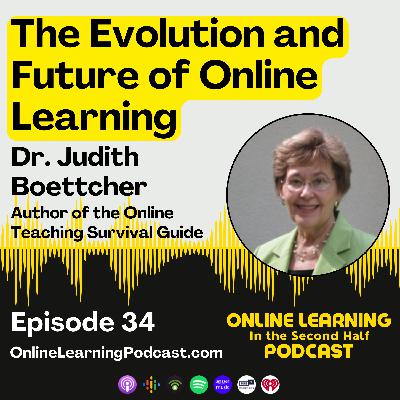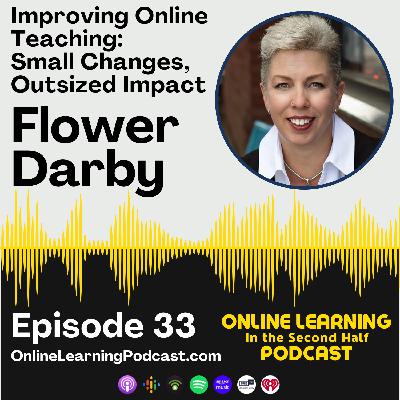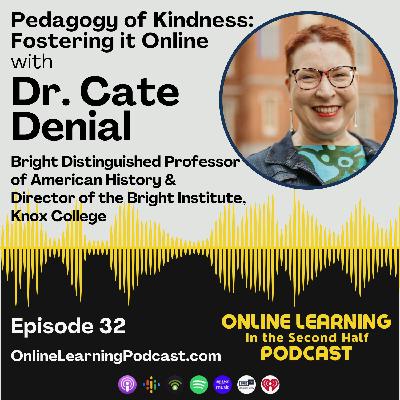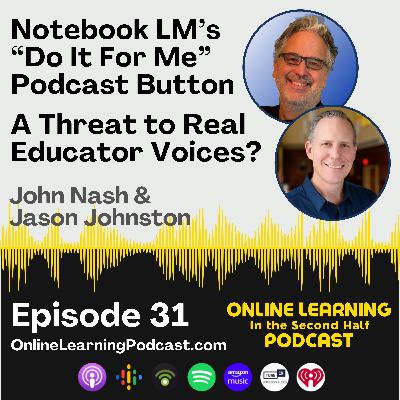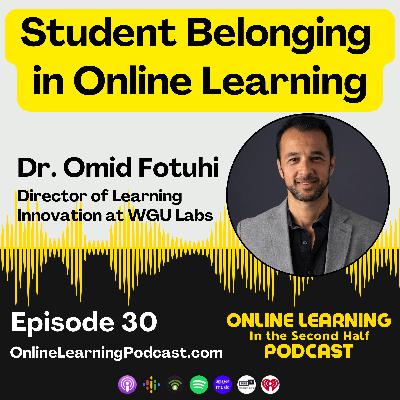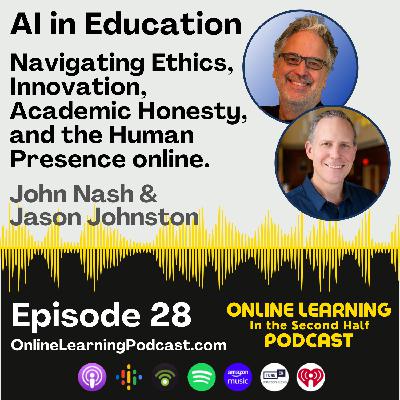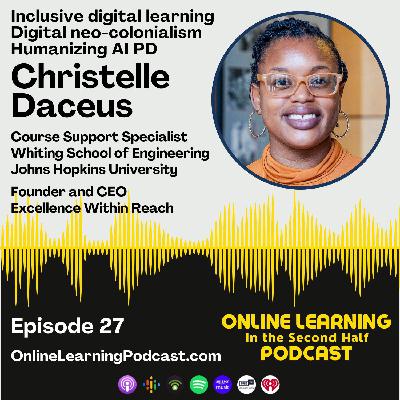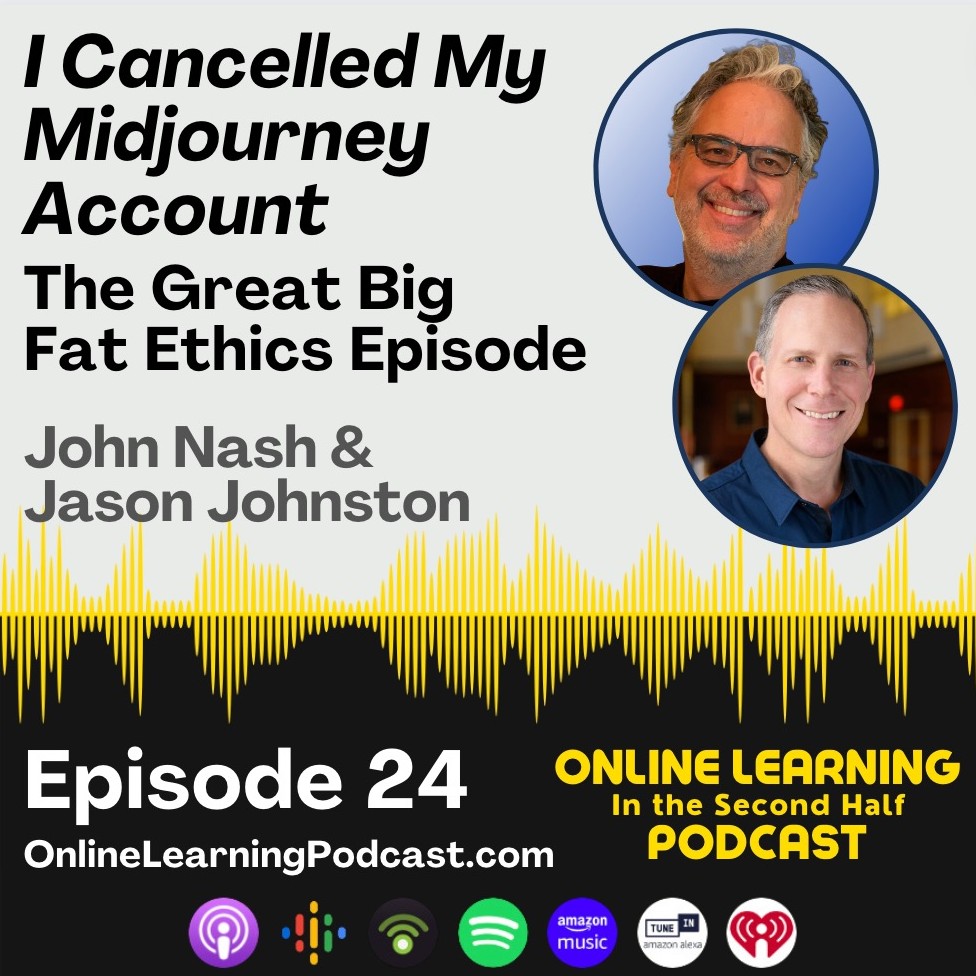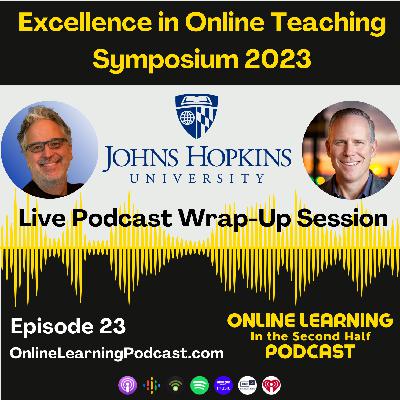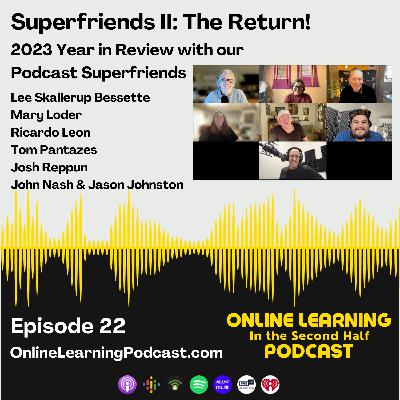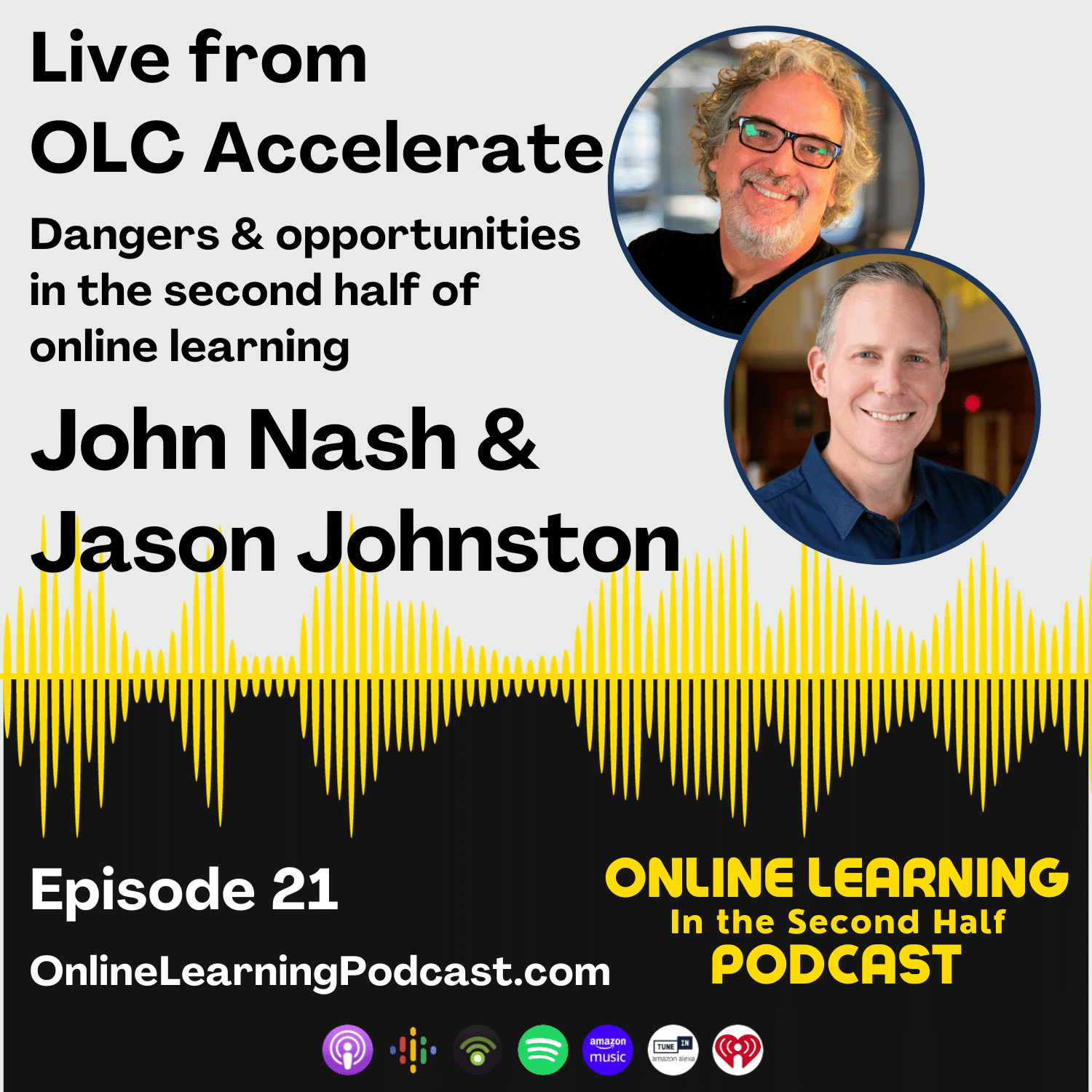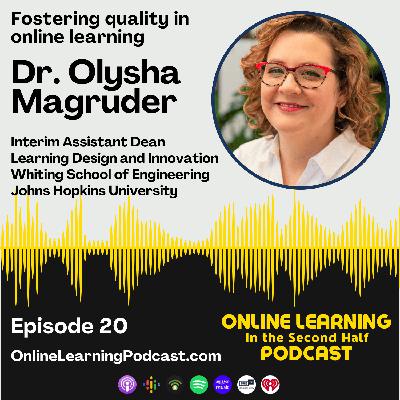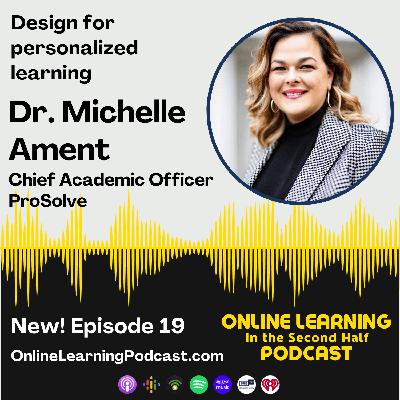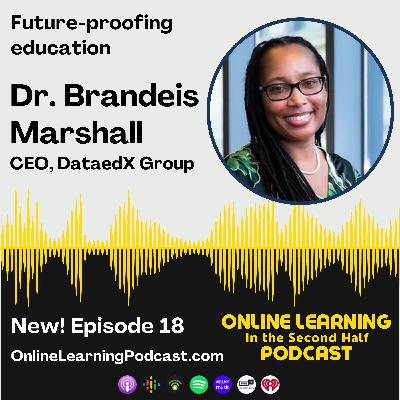EP 35 - Educators with or versus AI? Grammarly, Canvas AI, and Cyborg Pedagogy
Description
In EP 35, John and Jason kick off fall 2025 with a conversation on how AI has been added to Grammarly and Canvas (whether we like it or not) and if the future of online learning will be formed by Cyborg pedagogy (and what that means).
See complete notes and transcripts at www.onlinelearningpodcast.com
Join Our LinkedIn Group - *Online Learning Podcast (Also feel free to connect with John and Jason at LinkedIn too)*
Guest Bios:
- John Nash, PhD, is an associate professor of Educational Leadership at the University of Kentucky.
- Jason Johnston, PhD, is the Executive Director of Online Learning and Course Production at the University of Tennessee, Knoxville.
Resources:
Theme Music: Pumped by RoccoW is licensed under an Attribution-NonCommercial License.
Transcript:
We use a combination of computer-generated transcriptions and human editing. Please check with the recorded file before quoting anything. Please check with us if you have any questions or can help with any corrections!
EP 35 - Educators with or versus AI? Grammarly, Canvas AI, and Cyborg Pedagogy
Jason: But I'm looking forward to the, great list of potential guests that we have. I don't want to say any names yet 'cause nobody said yes yet.
John: No.
Jason: We don't have any yeses yet,
John: Yeah. Everybody's just
Jason: on the calendar yet
John: our list is amazing,
Jason: Yeah, we've got a great list.
John: no one's, we haven't sent them invitations yet.
Jason: Yeah. Well, yeah, I guess there's that too. So we haven't gotten any nos. That's a good part
John: No. No.
Jason: Yeah.
John: No. Yes.
I'm John Nash here with Jason Johnston.
Jason: Hey, John. Hey everyone. And this is Online Learning in the second half, the Online Learning podcast.
John: Yeah. We're doing this podcast to let you in on a conversation we've been having for now our third season kicking off about online education. I know. And so, hey, newsflash, online learning is still trying to be great. Some of it is, a lot of it still isn't quite there,
Jason. We're gonna keep talking about how to get it to the next stage.
How are we gonna do that?
Jason: That is a great question. How about we talk about today, what we're thinking about this fall as we head into this new school year and new season?
John: Yeah, absolutely. It's been an interesting summer. Little things popping up here and there. I notice Grammarly's doing some interesting things. Looks like Canvas is doing some things. A lot of stuff on the horizon.
Jason: . Yeah. And I would love to get into those, but I wanted to just kind of on the front end as we're kind of restarting the season, just even talk a little bit about, just a overall standpoint just for a moment here to talk about why we are doing this podcast. What do you think, John? Why are we doing this podcast again?
John: I think we're doing this podcast for a couple of reasons. I'll throw out the very selfish reason why I'm doing this podcast. This is my professional development activity. This keeps me honest in terms of thinking about what I believe is important about teaching and learning online.
It also gives me a chance to hear what you're thinking and I value your opinion and your philosophies a lot. And I think it also lets us share some ideas with like-minded people who are really interested in trying to make online teaching and learning better.
Jason: Yeah. That's good. I've got a check mark beside all those. Always enjoy the conversation with you, John. This is a big part of wanting to do these. I always look forward to them and And we realized when we started adding guests to our podcast, although we really enjoy our conversations, but it just adds another element of another voice. And that's one thing I really value about bringing different guests with different viewpoints in. As we get started this year, I hope to bring in some different viewpoints, not just people that would just agree with everything that we have to say, but people that maybe would challenge us and challenge some of our approaches to online learning and integrating technology and trying to humanize online learning, all of those things. I would love to get into conversations with people who really push us to think more deeply and more concretely as well. Like, how is this really gonna play out?
John: Yeah, I want to keep talking about that. I want to keep talking about as we're gonna probably chat about today as we think about the topics that I wanted to bring up things are getting a little more automated. The prevalence of AI across platforms is increasing and it's going to be a slippery slope, I think, for keeping humans in the loop.
I think even the, sort of the sales scripts that are coming out are saying, it's almost as if it's saying, " you don't need as much humanity in the loop; we got this now." And I don't think that's the case. And I think I want to, I want to be a part of the band that's playing the song set that says, Hey folks, we need to stick together on this.
We need to be humans in this loop and keep it all human centered.
Jason: Yeah, I agree. Yep. Well, those seem like perfect themes to keep going on here in our podcast. And as part of that you were talking a little bit to me the other day about these kind of new features that Grammarly is rolling out. And a lot of people, I use Grammarly. I used it on my I use it often. Sometimes it's a little frustrating 'cause it just pops up everywhere it seems like now that I have it, installed on my computer, but I find it very helpful. I don't pay for it right now. I'm not being paid by them, but I find it very helpful to just have this grammar help.
But it feels like they're moving into a new kind of AI era.
John: Yeah. And what's interesting is here, in my department we have a doctoral program. We have an online curriculum. We held the first meeting of the new cohort of doctoral students and we talked about, tools that they might find useful in their doctoral journey.
And we had some currently enrolled doctoral students, a couple of other professors. And Grammarly came up. And one of the new students asked " if I use Grammarly for like, changing my phrasing or things like that, is that gonna be considered cheating when in my new program with you?"
And and I said, and my colleague, professor, colleague also concurred that I asked students to use Grammarly before they turn in their material. Because, as a mentor in a scholarly process, I want to be able to think about the ideas that they are bringing forth, and not necessarily the mechanics and correcting the copy.
I want to jump right into the thinking. And so by running the typical Grammarly checker on subject verb agreement and clearing up things, that's fine. I like doing that. Now , I'm jumping into Grammarly and I'm seeing new features are popping up.
And so it's interesting to think about what are these new AI agents that they're sticking in there that go beyond just checking your grammar as the name of the app says it's "Grammarly," right? We want, " please turn in your stuff having been checked for grammar."
We like that 'cause we can get to the ideas. But what do we think about these new agents? I'm not so sure yet because they're, it's kind of interesting.
Jason: yeah. And it's a good question by the student. I'm glad you're having the conversation. Right. It was like, it was just over a year ago, there was a university of North Georgia student who was placed on academic probation, accused of using AI for for creating a paper. Whereas she said that she just used Grammarly for fixing and getting feedback on some of the grammar, right?
I think that we need to be thinking about what the features are as well as how we're having these conversations with students and where, where our limits are.
So, what all did you find out about Grammarly as you were digging into it?
Some of your thoughts.
John: So Grammarly has all these agents now and stuff we knew about before, a plagiarism checker and some, but they have a paraphraser now, a reader reactions agent,
A proof reader. Duh. That's why we use it.
Jason: Yes.
John: And AI grader.
And so the AI grader. " Revise. Revise your writing with purpose and see your score improve, get feedback based on your assignment rubric and instructor expectations so you can make changes that count."
" Estimate your grade, get early feedback. Revise with intention and submit confidently." So it's an agent that "estimates your score based on your assignment rubric and your instructor's grading style."
Oh boy. It "provides personalized feedback, allowing you to see how your writing aligns with the assignment requirements and make adjustments to improve your grade. Ideal for all types of written assignments."
" It's designed for students who want to predict how their work will land with their instructor and take control of their grades."
I mean, I guess, well, I mean, wouldn't it be nice if you just had a good relationship with your instructor?
Jason: That does feel ideal.
But at the same time, I mean, we've always . Encoura


